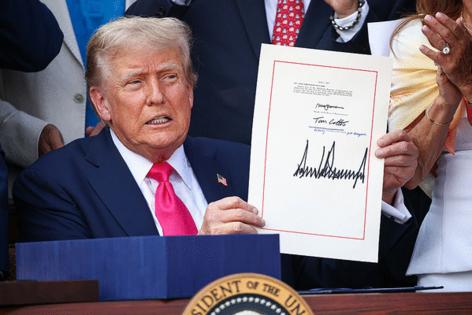Here's when everything in Trump's 'Big, Beautiful Bill' takes effect
Published in Political News
President Donald Trump signed the One, Big, Beautiful Bill Act this summer, but the legislation’s staggered nature means its full impact will not be seen for several years.
Trump and his Republican allies have championed the law because most Americans will continue to pay less in federal income taxes. Democrats have argued these tax cuts disproportionately benefit the wealthy and are essentially paid for by slashing vital government services.
As a general rule, the more popular parts of the bill — such as Trump’s campaign pledge for “no tax on tips” — will take effect immediately, while the more controversial actions on health care and food stamps won’t become law after the 2026 midterm elections.
Here’s a look at when each of the major provisions in the bill will take full effect:
2025
The bill permanently extends provisions of the 2017 Tax Cuts and Jobs Act (TCJA), the signature legislation of Trump’s first presidential term. This means most taxpayers won’t see much change to their tax burden because federal income tax brackets for tax year 2025 and beyond will remain at 2018 levels. The bill’s passage kept more than 60% of Americans from seeing a tax increase in 2026, according to an analysis from the nonpartisan Tax Foundation.
Because the new legislation builds upon the TCJA this year, it also comes with increases to the standard deduction and Child Tax Credit. The standard deduction now starts at $15,750 for single filers and $31,500 for married filers, while the Child Tax Credit increases from $2,000 to $2,200 in 2025. Both will change with inflation annually.
Beginning this year and continuing through 2028, workers will no longer have to pay federal taxes on up to $25,000 of tipped wages, up to 250 hours of overtime wages, or any interest on car loans. Taxpayers 65 and older can deduct an additional $6,000 from their income through 2028, according to the legislation.
More stringent work and residency requirements for Supplemental Nutrition Assistance Program (SNAP) recipients have no explicit start date, meaning people could be required to work at least 20 hours per week to receive food stamps as soon as this year.
2026
The restructuring of student loan repayments is among the biggest changes to take effect under the legislation next year.
Beginning in July 2026, existing federal student loan forgiveness plans — such as SAVE, ICR and PAYE — will cease operations. Borrowers will then have to enroll in either (1) a standard 10-year or 25-year repayment plan, or (2) a repayment plan with monthly payments of between 1% and 10% of their income for up to 30 years.
Also beginning in 2026, states that expanded Medicaid beyond the Affordable Care Act’s minimum requirements will see their federal matching funds gradually decrease. By the end of 2026, states must require Medicaid beneficiaries to work or perform community service for at least 80 hours per month.
2027
Beginning in 2027, the legislation will eliminate the option to defer student loan payments for economic hardship or unemployment.
The bigger changes in the final years of Trump’s second term come with stricter work requirements for Medicaid. Effective Jan. 1, 2027, the legislation requires states to deny Medicaid applications from people who are not working at least 80 hours per month and terminate benefits for people enrolled who cannot prove they are meeting work requirements.
The Medicaid work requirement applies to people 19 to 64 and exempts caregivers of dependent children, people with disabilities, pregnant women and several other groups. The nonpartisan Congressional Budget Office estimates these changes could put 7.8 million people at risk of losing Medicaid coverage by 2034.
2028
Beginning in 2028, states will be required to cover up to 15% of SNAP costs currently picked up by the federal government. This change will likely pose a dilemma for governors and state lawmakers, who will have to decide between raising taxes to make up for lost federal funds or further cutting food stamps for their residents.
Many of the bill’s short-term tax benefits will end in tax year 2028 as Trump leaves office. These include the provisions pausing federal income tax up to $25,000 of tipped wages, up to 250 hours of overtime wages and interest on car loans, as well as the $6,000 deduction for senior citizen taxpayers.
-------------
©2025 The Baltimore Sun. Visit at baltimoresun.com. Distributed by Tribune Content Agency, LLC.

























































Comments